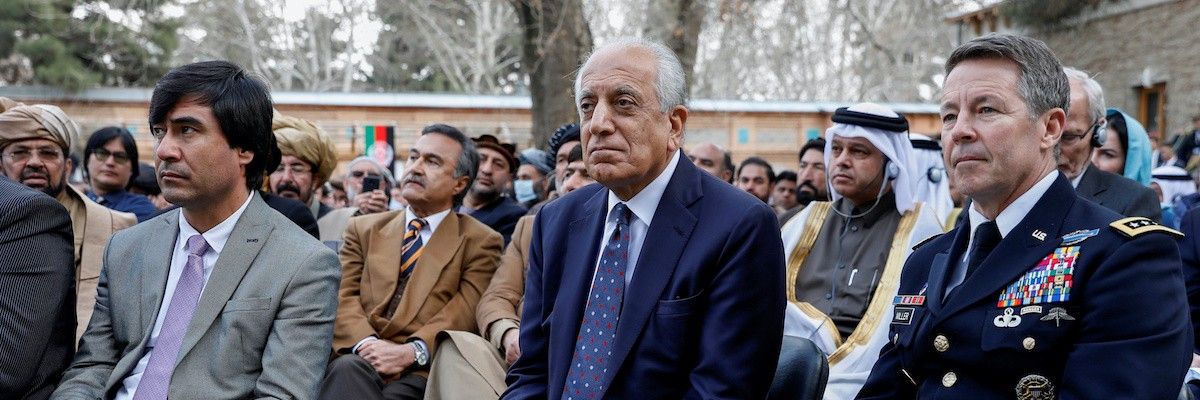Since 2002, the United States has spent nearly $145 billion on reconstruction activities in Afghanistan. Of that sum, $88 billion (or roughly 61 percent of the entire total) was earmarked for building, arming, equipping, and training a professional Afghan national army and police force. Supported by the most capable air force in the world and backstopped by U.S. intelligence assistance and unconditional diplomatic support from the international community, the Afghan government was, until now, in reasonably decent shape against the Taliban.
For the political elite in Kabul, having the U.S. respond whenever their troops came under fire was a pretty good arrangement. But for Washington, maintaining this kind of status-quo indefinitely was a drag on resources and bureaucratic attention (not to mention costly for the thousands of U.S. troops who were ordered to ensure Kabul didn’t collapse).
Indeed, while the vast majority of the American public supported using U.S. military force in Afghanistan to retaliate against Al-Qaeda and its Taliban enablers for the 9/11 attacks, Americans were never particularly enthralled with using their military to construct an Afghan state from scratch (even the late Donald Rumsfeld wasn’t gushing to get into the state-building business). Successive U.S. administrations, however, gradually shifted the mission in this direction —and U.S. officials couldn’t have picked a tougher place to do it. When President Biden announced in April that U.S. forces would depart Afghanistan by September, the nation breathed a sigh of relief. Three months after Biden’s speech in the White House, 70 percent of Americans remained supportive of the withdrawal.
Of course, just because a decision is popular doesn’t mean it’s necessarily right. But Afghanistan was one of those rare instances in the foreign policy space where the merits of withdrawing U.S. troops — extricating from a decades-long civil war with no diplomatic resolution in sight; belatedly accepting the limitations of what the U.S. could do in Afghanistan; finally concluding that trapping oneself in a sunk-cost fallacy is totally counterproductive to a healthy grand strategy — moved in the exact same direction as public opinion.
Naturally, the withdrawal isn't without costs. As this article is being written, the U.S.-sponsored Afghan army is at its most demoralized in the institution’s history. The Taliban have captured 11 provincial capitals in the short span of a week, the most notable being the city of Ghazni about 80 miles south of Kabul, with the city of Herat in the west, and Kandahar, Afghanistan’s second largest city, on the verge of falling Thursday night, according to news reports. (Editor's note: Kandahar, Herat, and Lashkar Gah, capital of Helmand, fell overnight after this article was published).
U.S. intelligence officials now assess the Afghan government could be overthrown in as little as one month. The Biden administration doesn’t want to take any chances with the safety of Americans in such a situation, dispatching an additional 3,000 U.S. troops to the Kabul airport to help in evacuation efforts there.
Former U.S. commanders and officials once responsible for the war effort in Afghanistan are blaming the country’s entire disintegration on President Biden’s decision to get out. David Sedney, a former deputy assistant secretary of defense for Afghanistan, Pakistan and Central Asia, told Bloomberg that nobody will trust Washington after this withdrawal is complete. Ret. Gen. H.R. McMaster, who apparently believed the U.S. could just bomb the Taliban into surrender terms, blasted the withdrawal as unfair to the Afghan security forces.
What all of these former officials can’t or won’t acknowledge, however, is that Afghanistan had been in such a fragile state for so long, that there was only so much the United States could do to save it (assuming you believe saving the government in Kabul in its current form was worth the effort, which is highly debatable). While it’s true that limiting U.S. airpower and pulling out professional military advisers will inevitably handicap the Afghan government, it’s also true that it was already suffering from every ailment under the sun. One is the utter absence of honesty and self-reflection on behalf of its senior officials, like when President Ashraf Ghani put the blame of the current violence entirely on Washington’s shoulders.
Never mind that, protected by countless security guards and blast walls, the Afghan government in Kabul became more and more detached from the people it was supposed to serve. Or that its national police force was always riddled with corruption. Or that as many as 70 percent of police positions were held by “ghost officers.” Or that in many cases, brave Afghan grunts on the frontlines were often relegated to fighting the Taliban on an empty stomach, shoddy resupply lines, unkept promises of reinforcements, and perhaps no salary (which may or may not have been stolen further up the chain of command).
None of this even touches the petty and systemic corruption that engrossed civil society on a daily basis, whether it was Afghan politicians in league with narcotics dealers, or Afghan officers stealing U.S.-supplied fuel or weapons on the black market. This, in effect, was what the U.S. military was defending for so long — and regardless of how many anti-corruption initiatives that were formed, or how strong the broadsides in the ears of the senior Afghan leadership, the problems never seemed to dissipate.
Afghanistan’s current security situation is horrifying. If the past is any indication, the bloodshed will only get worse as the days and weeks roll on. More provincial capitals will be taken from the Afghan government’s grasp. The Biden administration will continue to insist a Taliban triumph in Kabul isn’t inevitable, even as more Afghan units negotiate their own surrenders.
Yet amidst this intensified civil war, the alternative to fully implementing the U.S. withdrawal — sticking around for another few months or years in the hopes the Afghan state will somehow reach the point of standing on its own two feet — simply wasn’t an option. Indeed, given the 20 years of prior experience, going down this route would have been the definition of insanity.
















